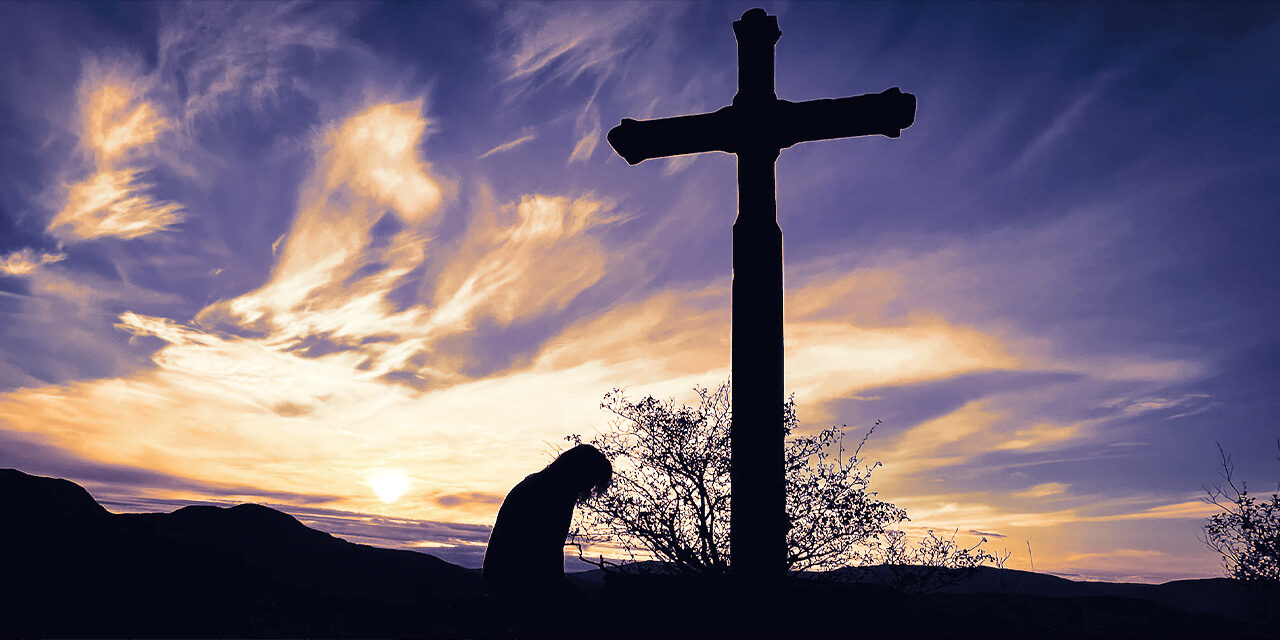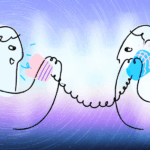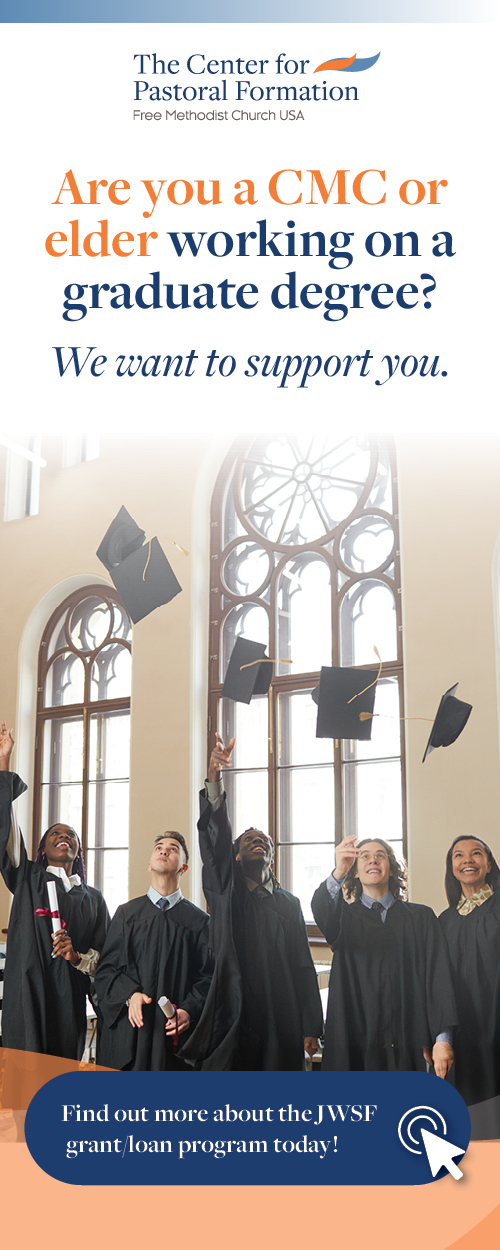
Ben Wayman
Ben Wayman is the lead pastor of St. Paul’s Free Methodist Church in Greenville, Illinois, and the author of “Make the Words Your Own: An Early Christian Guide to the Psalms.” He’s also the James F. and Leona N. Andrews chair in Christian unity at Greenville University and the chair of the university’s theology department.
By Ben Wayman
Repentance is the beginning of discipleship. Through repentance we change course to a path we never would have chosen were it not for our decision to follow Jesus. Repentance is not only the beginning of our discipleship, but also a gift to sustain us as we follow Jesus. Because conversion and discipleship are ongoing, Christians repent regularly to keep close to Jesus.
_
“Through the church, we learn how to repent to God and one another as we find our way back to God.”
_
Repentance is both a personal and a communal action. It’s personal in that we repent as persons who must choose daily to follow Jesus. It is communal as we repent as a church for times we stumble while following Jesus. We need each other to follow Jesus, and so it’s critical that we have friends who know how to repent personally and collectively of the self-serving ways we sometimes choose instead of following Jesus. Through the church, we learn how to repent to God and one another as we find our way back to God.
In this devotional article, I’d like to share a recent experience with our repenting church, circle back to Psalm 32 through a trustworthy guide, and then share a bit on how this is a sign that we’re becoming better friends with God. Let’s begin with a brief exploration of Psalm 32 and how it gives us the words for repentance.
Psalm 32 is a prayer of gratitude for God’s forgiveness. It’s the second of seven penitential psalms identified by early Christians who used these prayers as tools for repentance. Here the praying community petitions God for deliverance by repenting. When the psalmist helps us pray, “I will confess my transgressions to the Lord,” we make the words of the psalm our own as we repent to God.
The goal of this repentance is clear from the start: blessedness, or as some translations read, happiness. This is not some fleeting happiness, but the deep joy that comes from being forgiven and drawn close by God. The first two verses of Psalm 32 underscore this happiness, while verse 3 displays how sin destroys our very body. Keeping silent and hiding our sin destroys the whole of us, and Psalm 32 gives us the words to repent and be set free by God. Praying the words of Psalm 32 brings us back to Jesus.
Justice and Repentance
Free Methodists are recovering the gift of repentance. On Sept. 8-10, Foothill Community Church and the Southern California Conference hosted the Justice Network Summit in Azusa, California. In my view, the Justice Network is the Free Methodist Church at its best, and the first few moments of our gathering affirmed this for me as we embraced the gift of repentance.
Foothill Lead Pastor Adrian Greer began the conference with a devotional message in which he encouraged us to become people who heal out of our wounds, like Jesus healed Thomas in John 20. He illustrated this with a story of how a church leader’s repentance had been for him a holy moment of healing. Southern California Superintendent Jon Sato followed Pastor Greer’s devotion with personal testimony that acknowledged the church’s injustice toward our leaders and lay persons of color, for which he repented on behalf of the Southern California Conference. In response, Bishop Matt Whitehead repented on behalf of denominational leadership as he asked for forgiveness from those who “have been hurt by the denomination in any way.” In our opening sessions of this Free Methodist conference, the tone was set for us to practice repentance and, through this repentance, to receive God’s forgiveness and healing.
Baptism and Repentance
In the fourth century, Athanasius of Alexandria wrote a letter to one of his congregants guiding him in praying the Psalms. Athanasius advised that we should make the words of the Psalms our own because these words have in them the power to heal us and make us holy. The words have the power to make us friends of God. In his counsel for Psalm 32, Athanasius suggests, “When you see people being baptized and rescued from a damaged world, and you marvel at God’s loving care for human beings, sing them Psalm 32” (Make the Words Your Own).
_
“Through the sacrament of baptism, we mark our initial repentance.”
_
Here Athanasius shows how baptism and repentance, the beginning of our life with Christ, are nothing less than our rescue from this broken world. Through the sacrament of baptism, we mark our initial repentance, our turning from this world to God’s kingdom, as we commit to following Jesus. Through baptism and repentance, God gives us gifts for becoming God’s friends.
Repenting and Lamenting
Repenting is related to lamenting. In the Justice Network Summit’s keynote address, Rev. Dr. Soong-Chan Rah shared that 40% of the Psalms are psalms of lament. Rah shared that lament is our appropriate response to pain and suffering. “Lament,” Rah writes in Prophetic Lament, “is honesty before God and each other.”
Similarly, repentance is our appropriate response to unfaithfulness. Repentance is being honest with God and each other. We need to repent not just initially, but also regularly, for sinning against God “in thought, word, and deed, by what we have done, and by what we have left undone,” for not loving God “with our whole heart …[or] our neighbors as ourselves” (Confession of Sin, Book of Common Prayer). Because our conversion is ongoing, God sustains us as we acknowledge and humbly repent when we are unfaithful.
When the Free Methodist Church repents, we draw nearer to God. Through repenting and lamenting, through telling the truth about the ways in which we have not loved God and our neighbor with our whole heart, we become holy. We become God’s friends.
_
“God wants to remake the whole of us…”
_
Through Psalm 32 we embrace the gift of repentance as we humbly repent and happily heal. God wants to remake the whole of us, refashioning us as His children “in whose spirit there is no deceit” (32:2). This is Christian freedom: We are set free from sin, death, and the devil. In this freedom, we receive repentance as the gift that it is. Through praying psalms like Psalm 32, the Free Methodist Church is being refashioned by the Holy Spirit to live into the fullness of God’s kingdom as God’s friends.
Psalms provides the prayers we need to repent and lament. We see this today in Psalm 32, and we are seeing this today in our church. May we continue to embrace God’s gift of repentance as we draw closer to Jesus and experience the liberating joy of being a forgiven people, healed and loved by God.+

Ben Wayman
Ben Wayman is the lead pastor of St. Paul’s Free Methodist Church in Greenville, Illinois, and the author of “Make the Words Your Own: An Early Christian Guide to the Psalms.” He’s also the James F. and Leona N. Andrews chair in Christian unity at Greenville University and the chair of the university’s theology department.









